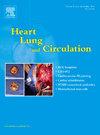氟脱氧葡萄糖正电子发射断层扫描检测症状性COVID-19后持续动脉炎症。
IF 2.2
4区 医学
Q2 CARDIAC & CARDIOVASCULAR SYSTEMS
引用次数: 0
摘要
背景:目前对COVID-19康复后成人持续血管和全身炎症的了解有限。本研究旨在利用氟脱氧葡萄糖正电子发射断层扫描(FDG-PET)评估症状性轻中度COVID-19的炎症是否在疾病明显临床消退后持续存在。方法:本观察性单中心队列研究邀请临床从轻至中度COVID-19康复的成年人(年龄在50至40岁)。在COVID-19诊断后至少30天后的同一天进行全身FDG-PET成像和c反应蛋白检测。纳入心血管疾病(CVD)高危的未感染covid -19的成年人进行比较(n=8);对这些参与者进行胸部FDG-PET成像。结果:在COVID-19诊断后中位数为97天(四分位数间距[IQR] 75-113天)进行FDG-PET成像。从COVID-19恢复的参与者显示动脉炎症增加(中位标准摄取值[SUV]max 3.1;IQR 2.7-3.3)与CVD高危参与者(中位SUVmax 2.5;差2.2 - -2.8;pmax和骨髓SUVmean (Spearman r=0.58;结论:通过FDG-PET显像可以检测到轻中度COVID-19患者持续的动脉炎症。需要更大规模的前瞻性研究来评估对心血管疾病风险的影响。本文章由计算机程序翻译,如有差异,请以英文原文为准。
Fluorodeoxyglucose Positron Emission Tomography Detects Persistent Arterial Inflammation After Symptomatic COVID-19
Background
There is limited knowledge of persisting vascular and systemic inflammation in adults recovered from COVID-19. This study aimed to assess whether inflammation from symptomatic mild-to-moderate COVID-19 persists beyond the apparent clinical resolution of disease using fluorodeoxyglucose positron emission tomography (FDG-PET).
Method
This observational single-centre cohort study invited adults (aged >40 years) who had clinically recovered from mild-to-moderate COVID-19. Whole-body FDG-PET imaging and C-reactive protein test were performed on the same day after a minimum of 30 days after COVID-19 diagnosis. COVID-19–naive adults at high-risk for cardiovascular disease (CVD) were included for comparison (n=8); thoracic FDG-PET imaging was performed for these participants.
Results
FDG-PET imaging was performed after a median of 97 days (interquartile range [IQR] 75–113 days) after COVID-19 diagnosis. Participants who recovered from COVID-19 showed an increased arterial inflammation (median standard uptake value [SUV]max 3.1; IQR 2.7–3.3) compared with the high-risk participants with CVD (median SUVmax 2.5; IQR 2.2–2.8; p<0.001). There was a moderate positive correlation between the total thoracic SUVmax and the bone marrow SUVmean (Spearman r=0.58; p<0.001) and the spleen mean SUVmax (Spearman r=0.62, p<0.001) for participants who recovered from COVID-19.
Conclusions
Ongoing arterial inflammation is detected by FDG-PET imaging after mild-to-moderate COVID-19. Larger prospective studies are needed to assess the implications on CVD risk.
求助全文
通过发布文献求助,成功后即可免费获取论文全文。
去求助
来源期刊

Heart, Lung and Circulation
CARDIAC & CARDIOVASCULAR SYSTEMS-
CiteScore
4.50
自引率
3.80%
发文量
912
审稿时长
11.9 weeks
期刊介绍:
Heart, Lung and Circulation publishes articles integrating clinical and research activities in the fields of basic cardiovascular science, clinical cardiology and cardiac surgery, with a focus on emerging issues in cardiovascular disease. The journal promotes multidisciplinary dialogue between cardiologists, cardiothoracic surgeons, cardio-pulmonary physicians and cardiovascular scientists.
 求助内容:
求助内容: 应助结果提醒方式:
应助结果提醒方式:


